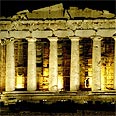
I'm no philosopher, and I don't play one on TV or online, but that old Greek Socrates knew what he was talking about.
"The unexamined life is not worth living," the ancient philosopher said 2,400 years ago, and what he meant by that was simple enough: Think about who you are, what you are doing, and the why of it all.
If you don't, you're not really living.
He could have had Israel and Israelis in mind when he said it, and not his fellow ancient Greeks.
The one common characteristic of Israelis secular and religious, Sephardic and Ashkenazi, orange and blue, is our willingness - in fact, need - to examine ourselves, our lives, our communities and our country.
This drive to think and act out of conviction is certainly our country's greatest strength, and occasionally its riskiest trait.
Who are we?
The Israeli character has been described in many ways: gruff, brusque, chutzpadik (or "chutzpani" in Hebrew), rough on the outside and soft on the inside.
Those are all true to varying degrees, but they only describe superficial characteristics. What lies underneath the surface is the intense willingness to address the deepest issues: Who are we? Why are we here? What are we?
I'll be the first to admit I don't always like the answers people give for these questions.
I don't believe we need to occupy every inch of "Greater Israel," whatever that means these days (biblical descriptions of "Eretz Israel" - and there are several that set out boundaries - include not only the so-called West Bank, but also the East Bank of the Jordan River, that is, today's country of Jordan) to fulfill the prophecies of the Bible and the hopes of the early Zionists.
On the other hand, I wouldn't find it easy to give up sovereignty or control of truly sacred spots such as the Old City of Jerusalem and even the Cave of the Patriarchs in Hebron, even though it is deep within a city of 100,000 Palestinians.
But what I am encouraged about is the willingness to grapple with these issues: What kind of people are we if cut ourselves off from engagement with our forebears and our tradition now that we are back in the land of our ancestors?
Polar opposites
Militantly secular Israelis take the opposite perspective: Tying ourselves to ancient tales disables us from engaging the post-modern world with its global interconnectivity, wireless communications and multinational cultural influences, they say.
The secular Israeli view of the black-frocked haredim (ultra-Orthodox) in Jerusalem's own shtetl, Mea Shearim, who won't say the word Internet, let alone use it, is one of complete disbelief.
Likewise, the haredi's devotion to his rebbe, the wall he builds around the fence surrounding the guarded enclosure in which he encapsulates the Torah and its tradition leaves no room for understanding, let alone empathizing with, his secular countryman.
Such polar opposites don't make it easy to navigate the byways of the country's political and strategic needs. Bitter clashes occur often. This is more than simply bothersome, of course. It can paralyze the country, whether by virtue of roadblocks or teachers' strikes.
I often long to make everyone heed the words of that other great philosopher, Rodney King, who said, "Why can't we all just get along?" in the wake of the 1992 Los Angeles riots.
But I am coming to a different conclusion about these debates and tussles: They represent a country and people that are as alive on the inside as on the outside. The intensity of life here is invigorating, challenging, stimulating and enriching, if you want it to be.
An examined life is never a boring one.
Alan D. Abbey is Editor and Managing Director of Ynetnews















